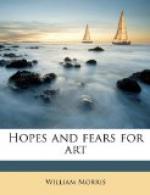Strange too, that very death is contemporaneous with new-birth of something at all events; for out of all despair sprang a new time of hope lighted by the torch of the French Revolution: and things that have languished with the languishing of art, rose afresh and surely heralded its new birth: in good earnest poetry was born again, and the English Language, which under the hands of sycophantic verse-makers had been reduced to a miserable jargon, whose meaning, if it have a meaning, cannot be made out without translation, flowed clear, pure, and simple, along with the music of Blake and Coleridge: take those names, the earliest in date among ourselves, as a type of the change that has happened in literature since the time of George II.
With that literature in which romance, that is to say humanity, was re-born, there sprang up also a feeling for the romance of external nature, which is surely strong in us now, joined with a longing to know something real of the lives of those who have gone before us; of these feelings united you will find the broadest expression in the pages of Walter Scott: it is curious as showing how sometimes one art will lag behind another in a revival, that the man who wrote the exquisite and wholly unfettered naturalism of the Heart of Midlothian, for instance, thought himself continually bound to seem to feel ashamed of, and to excuse himself for, his love of Gothic Architecture: he felt that it was romantic, and he knew that it gave him pleasure, but somehow he had not found out that it was art, having been taught in many ways that nothing could be art that was not done by a named man under academical rules.
I need not perhaps dwell much on what of change has been since: you know well that one of the master-arts, the art of painting, has been revolutionised. I have a genuine difficulty in speaking to you of men who are my own personal friends, nay my masters: still, since I cannot quite say nothing of them I must say the plain truth, which is this; never in the whole history of art did any set of men come nearer to the feat of making something out of nothing than that little knot of painters who have raised English art from what it was, when as a boy I used to go to the Royal Academy Exhibition, to what it is now.
It would be ungracious indeed for me who have been so much taught by him, that I cannot help feeling continually as I speak that I am echoing his words, to leave out the name of John Ruskin from an account of what has happened since the tide, as we hope, began to turn in the direction of art. True it is, that his unequalled style of English and his wonderful eloquence would, whatever its subject-matter, have gained him some sort of a hearing in a time that has not lost its relish for literature; but surely the influence that he has exercised over cultivated people must be the result of that style and that eloquence expressing what was already stirring in men’s minds; he could not have written what he has done unless people were in some sort ready for it; any more than those painters could have begun their crusade against the dulness and incompetency that was the rule in their art thirty years ago unless they had some hope that they would one day move people to understand them.




